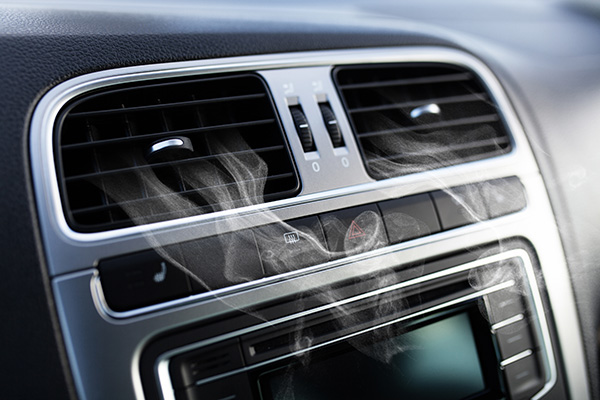
Your car can communicate problems in many ways—warning lights, strange noises, and sometimes, unfamiliar smells. While some odors might be temporary and harmless, others can point to mechanical issues, fluid leaks, or safety concerns. Knowing which smells to take seriously can help you act early and avoid more costly or dangerous situations.
Here are six smells you should never ignore if you notice them inside or around your car.
1. Rotten Eggs or Sulfur Smell
If your car smells like rotten eggs or sulfur, there’s a good chance the problem is related to your emissions system—specifically the catalytic converter. This component helps neutralize harmful gases, and when it’s failing or overloaded, it can produce a strong sulfur-like odor.
A faulty oxygen sensor, engine misfire, or unburned fuel in the exhaust system can also lead to this smell. Since your emissions system is directly tied to fuel efficiency and engine performance, it’s important to get it checked as soon as possible.
2. Sweet or Syrupy Scent
A sweet smell, especially one you notice after turning the engine off or when the car is warm, could mean a coolant leak. Antifreeze has a distinctive sweet odor that’s usually easy to detect. This could indicate a leaky radiator, heater core, or a worn hose. Even if you don’t see coolant on the ground, the smell alone is reason enough to take a closer look.
Coolant leaks can lead to overheating and serious engine damage if not addressed promptly—especially during warmer months or on long drives.
3. Burning Oil
If you smell burnt oil, your engine may be leaking oil onto a hot surface, like the exhaust manifold. This can happen if the valve cover gasket, oil pan, or other seals have started to fail. You might also notice smoke from under the hood, or dark spots on your driveway.
While this might not immediately affect how your car drives, it's a sign that you’re losing oil, and over time, that can result in low oil pressure and engine wear. Plus, the smell can be overwhelming in the cabin if left untreated.
4. Moldy or Musty Odors
A damp, musty smell coming from your vents usually means moisture is trapped in your HVAC system—often in the evaporator core. Over time, this creates a breeding ground for mold and mildew. If you notice this smell when you turn on the air conditioning or heat, your A/C system may need to be cleaned or the cabin air filter replaced.
This issue isn’t just unpleasant; it can also affect the air quality in your vehicle and aggravate allergies or respiratory issues.
5. Burning Rubber
A burning rubber smell often means something is overheating or coming into contact with a moving part. This could be a loose hose rubbing against a belt, worn-out drive belts slipping under load, or overheated brakes or tires. If the smell appears when accelerating, braking, or after driving uphill, it’s worth having your vehicle checked.
Ignoring the source of a rubber smell could lead to part failure or safety issues—especially if it’s related to the braking system or drivetrain.
6. Raw Gasoline
Gasoline has a strong and recognizable odor, and if you smell it around your vehicle when the engine is running or after refueling, it’s a cause for concern. A gas smell can be the result of a leaking fuel line, faulty injector, vapor system failure, or even a loose gas cap. While the problem might be minor, fuel vapor is highly flammable, so it’s not worth the risk to wait.
This is a smell that requires immediate attention—both for your safety and for the sake of passing emissions inspections.
Portland Automotive – Protecting Portland Drivers From Hidden Issues
At Portland Automotive in Portland, CT, we know that strange car smells are often your vehicle’s first way of signaling a problem. Whether it's a leak, a failing part, or something more serious, our team can track down the source and provide reliable repairs. If your car smells off, don’t ignore it. Schedule a visit with us today, and let us help you breathe easily behind the wheel.